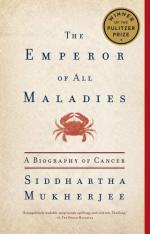
|
| Name: _________________________ | Period: ___________________ |
This test consists of 5 short answer questions, 10 short essay questions, and 1 (of 3) essay topics.
Short Answer Questions
1. The trend was targeted toward whom?
2. A "Risky prediction" is a term coined by who?
3. "Part 6: The Fruits of Long Endeavors" begins with a quote by whom?
4. Rather than initiating his studies with cancer in its full-blown form, Auerbach has tried to understand what?
5. The ______________, led by Rous, claimed that viruses cause cancer, although no such virus had been found in human studies.
Short Essay Questions
1. What is Genentech? How is this company important?
2. What is the Red Queen Syndrome?
3. What are two reasons why studies into the connection between lung cancer and tobacco were inconclusive?
4. How does Carla say she survived? Is this valid? Why or why not?
5. What was STAMP? How did this bring hope to those who suffered from cancer?
6. What is the significance of the SRC gene?
7. What did Percival Pott notice? How is this significant?
8. What was the oncomouse? Was this successful? Why or why not?
9. What is the oncogene theory?
10. What is the role of a clinician? What type of people are suited for this work?
Essay Topics
Write an essay for ONE of the following topics:
Essay Topic 1
Cancer is not the only disease discussed in this book.
Part 1) What are two other diseases discussed in this book? Describe these two diseases. What is the purpose of having these diseases discussed in this book?
Part 2) How do these diseases compare to cancer? Which disease do you find to be the most threatening to the American people? Why?
Part 3) What similarities can be found among various diseases including all that are discussed in this book? How is this important?
Essay Topic 2
Mukherjee discusses the history of cancer.
Part 1) When was the finding and study of cancer first seen? How is this surprising? Why might knowledge and/or discussion of cancer stopped after this period of time? Did cancer still exist? Why or why not?
Part 2) What are two other times in history when the study of cancer took place? What did doctors and scientists know about cancer at that time? On what information was this knowledge based? How accurate was this knowledge?
Part 3) What is known about cancer today? How much of our knowledge today is based on previous knowledge? How important is cancer history to the study of cancer today? Why? How is history, in general, important to us today?
Essay Topic 3
In 1968, Farber celebrated the 21st anniversary of the Jimmy Fund.
Part 1) What was the Jimmy Fund? How was the fact it had celebrated its 21st anniversary important? Who was Jimmy? How is his life significant to the study of cancer?
Part 2) What is also significant about what is known about his reasons for survival? What does this also say about cancer and cancer research?
Part 3) What other celebrities are found in this book? Who became a celebrity because of cancer? Why? How did this affect cancer research and the public's support of cancer research? How are celebrities today still important to various medical organizations? Why?
|
This section contains 1,204 words (approx. 5 pages at 300 words per page) |

|




